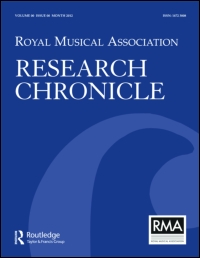No CrossRef data available.
Article contents
The First Undoubted ‘Magic Flute’?
Published online by Cambridge University Press: 01 January 1974
Extract
Which was the first reasonably complete and faithful performance of Die Zauberflöte in English?
In common with other Mozart operas, and despite its unabated popularity on the Continent, Die Zauberflöte came late and haltingly to the English stage. The date of its introduction is somewhat problematic. Dennis Arundell has drawn attention to an advertisement in The Times of 29 March 1806. A comic opera, Adolf and Clara, was to be performed that evening at the German Theatre (or Sans Souci), Leicester Square: ‘After which, a Pantomime Dance: and, for the 1st time, a new Musical Piece, by Mozart, called The ENCHANTED FLUTE; and to conclude with the Optical Ballet.’ No more is known beyond the bald statement. The production was apparently in English, and admittedly there was music, but does it appear likely that this was a serious attempt at the whole work? Introduced into the programme as a mere afterpiece, sandwiched between other diversions, and so very modestly announced, it sounds at the best estimate a heavily truncated version. Indeed the probability is that the piece was got up hastily in order to capitalize on the interest aroused by the Haymarket's production of La clemenza di Tito two days earlier, that being the first time a Mozart opera had been performed in England.
- Type
- Research Article
- Information
- Copyright
- Copyright © Royal Musical Association, 1974
References
∗ 1 D. Arundell, The critic at the opera, (London, 1957), p. 286.Google Scholar
∗ 2 See Fenner, T., Leigh Hunt and opera criticism: the ‘Examiner’ years, 1808–1821, (Lawrence, Kansas, 1972), pp. 168–9.Google Scholar
1 Ibid, pp. 207–10, 310–11. Also Leigh Hunt Dramatic criticism, 1808–31, ed. L. H. and C.W. Houtchens (New York, 1949), pp. 214–18. Hunt doubted whether Die Zauberflöte would ever be so popular as Figaro or Don Giovanni: ‘It is, we suspect, too poetical to be so - too much referring to indefinable sentiments and sensations out of the pale of common experience….’ It was analogous to The Tempest in the Shakespeare canon. Hunt's comments on the 1819 production may be compared with those in The Times (27 May) and Morning Chronicle (27 May), the former generally favourable, the latter not.Google Scholar
2 Norwich Mercury, 2 August 1823.Google Scholar
1 Norwich Theatrical Observer no. 14, March 1827. Also Norfolk Chronicle, 24 May 1828.Google Scholar
2 Norwich Mercury, 7 June 1828.Google Scholar
1 A surviving copy of the pamphlet is in the Colman Collection, Norwich Public Library, which also preserves a copy of the theatre bill for the production.Google Scholar
2 Quoted in T. D. Eaton, Musical criticism and biography, (London, 1872), p. 253, Taylor was in correspondence with Spohr as early as 1829 when making arrangements for the first English performance of the composer's Die Letzten Dinge at the Norwich Triennial of 1830. The concert at which Spohr's work was performed also contained a scene from Die Zauberflöte, adapted by Taylor to a sacred text under the title ‘The Dedication of the Temple’ and sung by him. R.M. Bacon publicly condemned this tampering with Mozart in the Norwich Mercury's review of the concert.Google Scholar
1 Moscheies, I., Recent music and musicians (reprint New York, 1970), p. 128. See also A. Einstein ‘The first performance of Mozart's Entführung in London', Music Review, vii (1946), pp. 154–60.Google Scholar
2 The Quarterly Musical Magazine and Review, ix (1827), pp. 520–9.Google Scholar
1 Norfolk Chronicle and Norwich Mercury, both 6 June 1829. It is odd that the Mercury showed no more enthusiasm. Its editor, R. M. Bacon, had until 1828 also edited the important Quarterly Musical Magazine.Google Scholar
2 Rohlffs published The germ of fine piano forte playing from Norwich in 1835. Possibly he abetted Mueller in his choice of Die Zauberflote.Google Scholar
1 Norwich Mercury 28 March 1835.Google Scholar


